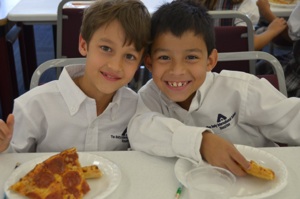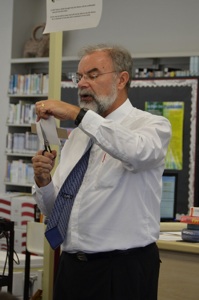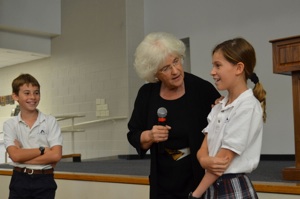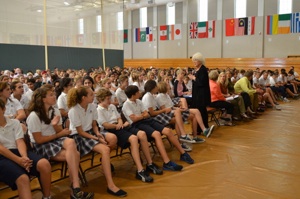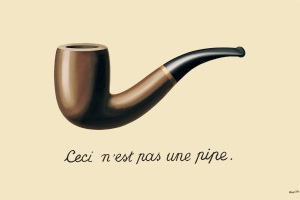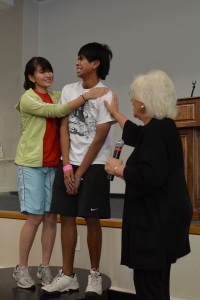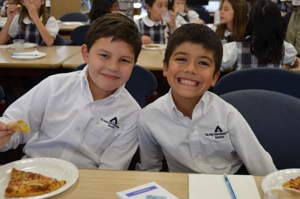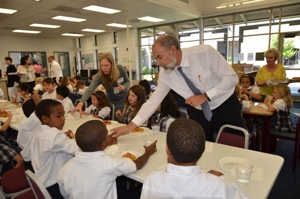It didn’t take long. It may be just three weeks after the students returned for the start of the new academic year, but Awty is in full swing! And full swing at Awty seems to mean running a marathon at the pace of a sprint – which is just the way I like it!
It is hard to do
justice to the range of experiences I have as Head of this great school in any given week. One real highlight for me this week took place on Friday, when I hosted the children in Years 2, 3, 4 and 5 who had exceeded their huge quota of book reading during the recent summer holidays. The children came to the “big kids’ library” where I helped serve them with pizza and drinks before entertaining them with the one, single, lonely magic trick that I have in my repertoire. I really enjoyed my time with these Primary School children, and we had some great conversations about some of the wonderful books they had read.
On Thursday evening and all day Friday, we were privileged to host Barbara Coloroso at the College. Identified on her website (
http://www.kidsareworthit.com) as “an internationally recognized speaker and author in the areas of parenting, teaching, school discipline, non-violent conflict resolution and reconciliatory justice,
Barbara captivated our
parents, students and teachers with her wit and wisdom as she spoke about the themes of her recent book, “The Bully, the Bullied and the Bystander” (see
this link).
On Wednesday evening we held our first Upper School Open House for this year. Well over 400 parents came to the campus to meet with their children’s teachers, following an abbreviated version of their children’s timetables to learn about the new courses their children will study this year. For my part, I not only welcomed all the parents at the start of the evening, but I enjoyed giving a presentation on Theory of Knowledge to the parents of the students in the class I teach.
Theory of Knowledge (or ToK as it is commonly known) is a subject that none of the students had studied before starting the IB Diploma just a few weeks ago. I think of ToK as being the glue that binds the IB Diploma together, transforming what would
otherwise be the study of six disparate subjects into one coherent entity. It examines the various ways we acquire knowledge (such as sense perception, reasoning, language and emotion), and it applies these to the different types of learning inherent in various areas of knowledge, such as ethics, the arts, history, mathematics, the natural sciences, and the human sciences. In short, it is a subject where students learn how to learn.
Speaking personally, I love teaching it, because at the heart of ToK is a recognition that there are important questions – both in academic study and life in general - that need to be addressed by all people. ToK suggests that this is best done through an organized framework of understanding rather than ad hoc decisions based on uninformed, gut reactions.
There is a somewhat fashionable worldview that claims that life and learning have no meaning. That may be right, of course, but ToK demands that we engage in the debate and robustly examine such claims. ToK aims to cut through indifference and woolly thinking as it requires students to examine their own ways of learning and their assumptions, and then understand the ways in which their various subjects mesh together.
In 1998, Pope John II produced a document called Fides Et Ratio. He said the biggest challenge facing the modern world is not consumerism, it is not global warming, it is not materialism, nor over-population – he claimed that the biggest challenge facing the world is the combination of relativism and post-modernism. He felt we have a generation growing up in schools who do not engage with the
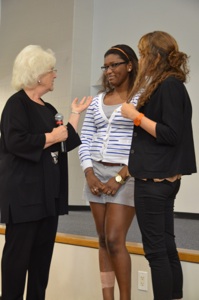
fundamental questions of truth and certainty. From a ToK perspective, his claim is not necessarily true just because he, as an authority figure, said it was so (nor, of course, is it necessarily false). Nonetheless, if his claim is true (and personally I do have some sympathy for it), then that would be a significant failure of education – one that the IB Diploma program seeks to address explicitly through courses such as ToK. Our world needs first-rate scientists, first-rate economists, and so on – but we need those scientists and economists to have also thought about ethics, to have considered the possible religious dimensions of the work they are doing, and to appreciate why their respective approaches are incapable of providing certainty in the way that mathematics (for example) can do.
The wonderful thing I find in teaching ToK is that although the concepts might sound intimidating at first, students usually quickly become very enthusiastic about having their minds opened to new possibilities. Frankly, though, it can also be depressing sometimes because so many young people say “we have this type of opportunity so rarely”.
In the short address I gave to my class parents on Wednesday evening, I quoted another teacher’s view of ToK: “Surely Theory of Knowledge (ToK) is one of the boldest courses ever to figure in any school’s curriculum. How can any course deal with all knowledge – and open discussion potentially to any knowledge from any culture in any historical time? The scope is vast.”
(quote from Dombrowski, Rotenberg and Bick (2007) ‘Theory of Knowledge Course Companion’, Oxford).
I also quoted from a former ToK student: “ToK is a subject where we, as students, can say what we really believe and is the first course where I have been taught to question just about everything I know. Paradoxically this has allowed me to feel that I know a large amount more about the world and about life than before. I also feel that it has greatly increased my tolerance and open-mindedness for different ways of thinking and different approaches to a particular problem. Teachers and students together ask the questions, and we students then try to find the answers within ourselves.”
(Mattias Ivarsson) As an educator, I often ask myself the important question “what makes a great education?”. It is difficult to sum up such a Big Question in a few short sentences, but at its heart, I think it means engaging with the broad
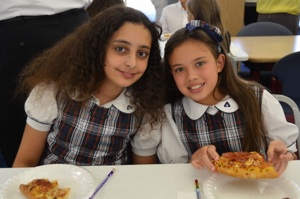
issue of what it means to be a fulfilled human being. It means asking questions about relationships (as we did with Barbara Coloroso this week). It means exploring new and imaginative ideas (as our Primary School children did during summer with their wide reading). It means asking questions about the nature of our world, about discerning reliable from unreliable information, distinguishing truth from falsity, and asking the deeper questions such as meaning and purpose in life. It certainly does not mean neglecting the things that are taught everyday, subject-by-subject, in every school around the world – it means expanding those subject-specific understandings into a creative and coherent view of the world around us – which is precisely what Theory of Knowledge aims to do for every IB Diploma student.
Any education that neglects this coherence must surely be a very impoverished education.







